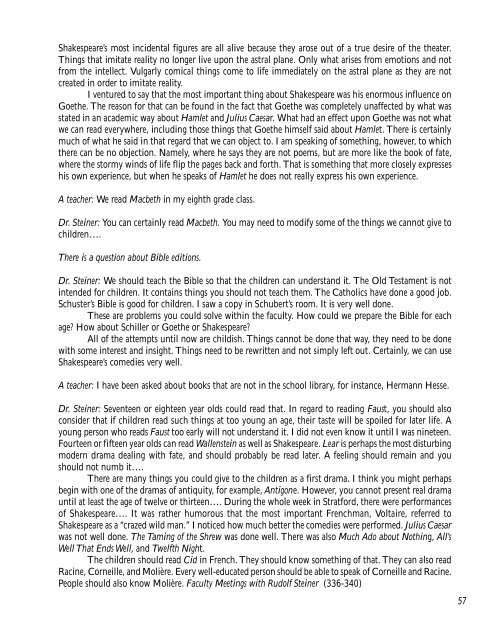Colloquium on English - Research Institute for Waldorf Education
Colloquium on English - Research Institute for Waldorf Education
Colloquium on English - Research Institute for Waldorf Education
You also want an ePaper? Increase the reach of your titles
YUMPU automatically turns print PDFs into web optimized ePapers that Google loves.
Shakespeare’s most incidental figures are all alive because they arose out of a true desire of the theater.<br />
Things that imitate reality no l<strong>on</strong>ger live up<strong>on</strong> the astral plane. Only what arises from emoti<strong>on</strong>s and not<br />
from the intellect. Vulgarly comical things come to life immediately <strong>on</strong> the astral plane as they are not<br />
created in order to imitate reality.<br />
I ventured to say that the most important thing about Shakespeare was his enormous influence <strong>on</strong><br />
Goethe. The reas<strong>on</strong> <strong>for</strong> that can be found in the fact that Goethe was completely unaffected by what was<br />
stated in an academic way about Hamlet and Julius Caesar. What had an effect up<strong>on</strong> Goethe was not what<br />
we can read everywhere, including those things that Goethe himself said about Hamlet. There is certainly<br />
much of what he said in that regard that we can object to. I am speaking of something, however, to which<br />
there can be no objecti<strong>on</strong>. Namely, where he says they are not poems, but are more like the book of fate,<br />
where the stormy winds of life flip the pages back and <strong>for</strong>th. That is something that more closely expresses<br />
his own experience, but when he speaks of Hamlet he does not really express his own experience.<br />
A teacher: We read Macbeth in my eighth grade class.<br />
Dr. Steiner: You can certainly read Macbeth. You may need to modify some of the things we cannot give to<br />
children….<br />
There is a questi<strong>on</strong> about Bible editi<strong>on</strong>s.<br />
Dr. Steiner: We should teach the Bible so that the children can understand it. The Old Testament is not<br />
intended <strong>for</strong> children. It c<strong>on</strong>tains things you should not teach them. The Catholics have d<strong>on</strong>e a good job.<br />
Schuster’s Bible is good <strong>for</strong> children. I saw a copy in Schubert’s room. It is very well d<strong>on</strong>e.<br />
These are problems you could solve within the faculty. How could we prepare the Bible <strong>for</strong> each<br />
age? How about Schiller or Goethe or Shakespeare?<br />
All of the attempts until now are childish. Things cannot be d<strong>on</strong>e that way, they need to be d<strong>on</strong>e<br />
with some interest and insight. Things need to be rewritten and not simply left out. Certainly, we can use<br />
Shakespeare’s comedies very well.<br />
A teacher: I have been asked about books that are not in the school library, <strong>for</strong> instance, Hermann Hesse.<br />
Dr. Steiner: Seventeen or eighteen year olds could read that. In regard to reading Faust, you should also<br />
c<strong>on</strong>sider that if children read such things at too young an age, their taste will be spoiled <strong>for</strong> later life. A<br />
young pers<strong>on</strong> who reads Faust too early will not understand it. I did not even know it until I was nineteen.<br />
Fourteen or fifteen year olds can read Wallenstein as well as Shakespeare. Lear is perhaps the most disturbing<br />
modern drama dealing with fate, and should probably be read later. A feeling should remain and you<br />
should not numb it….<br />
There are many things you could give to the children as a first drama. I think you might perhaps<br />
begin with <strong>on</strong>e of the dramas of antiquity, <strong>for</strong> example, Antig<strong>on</strong>e. However, you cannot present real drama<br />
until at least the age of twelve or thirteen…. During the whole week in Strat<strong>for</strong>d, there were per<strong>for</strong>mances<br />
of Shakespeare…. It was rather humorous that the most important Frenchman, Voltaire, referred to<br />
Shakespeare as a “crazed wild man.” I noticed how much better the comedies were per<strong>for</strong>med. Julius Caesar<br />
was not well d<strong>on</strong>e. The Taming of the Shrew was d<strong>on</strong>e well. There was also Much Ado about Nothing, All’s<br />
Well That Ends Well, and Twelfth Night.<br />
The children should read Cid in French. They should know something of that. They can also read<br />
Racine, Corneille, and Molière. Every well-educated pers<strong>on</strong> should be able to speak of Corneille and Racine.<br />
People should also know Molière. Faculty Meetings with Rudolf Steiner (336-340)<br />
57

















